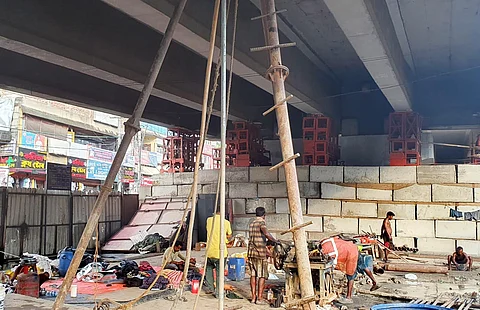
- Home
- Live Blog
- Breaking News
- Top Headlines
- Cities
- NE News
- Sentinel Media
- Sports
- Education
- Jobs

Staff Reporter
Guwahati: Not only the common people but even the Assam PWD are doubtful regarding the fate of the Six Mile flyover in Guwahati. The PWD has now asked the Rail India Technical and Economic Service (RITES) to carry out detailed tests to determine the integrity of the flyover's foundations. RITES has been involved for some time now in testing and determining the faults in the structure.
It was from the end of 2024 that a question has been eating at the minds of the people. Is the Six-Mile flyover really safe for the passage of vehicles? People in vehicles passing over it were worried whether the structure would fall or if the government would dismantle the 1.65 km flyover. It was noticed that several cracks had developed on pillar no. 4. When proper examination of the pillar was done, it was concluded that the pillar had failed. Concrete supports were placed to prop up the pillar as a temporary measure.
On Friday, a senior engineer of the Dispur Dimoria Territorial PWD-Road Division told The Sentinel, "When cracks had developed in pillar no. 4 of the Six Mile flyover, the Assam PWD entrusted RITES with carrying out a detailed examination of the faults. Recently, RITES has been instructed to undertake an in-depth study of all the pile foundations and submit a report with recommendations of measures to be taken to rectify the faults."
When a correspondent of The Sentinel visited the site, he met a technical person engaged in the examination work on the flyover. He stated that a sonic test of the pile foundations was being conducted. It was expected to take around one month to complete the test on all the foundations.
A sonic test of a foundation, also known as Sonic Integrity Testing (SIT) or Pile Integrity Testing (PIT), is a non-destructive method that uses sound waves to evaluate the internal soundness and continuity of deep foundation elements like concrete piles. By striking the top of the foundation with a hammer and measuring the returning sound wave echoes with an accelerometer, the test can identify defects such as cracks, voids, or changes in the pile's cross-section, though it doesn't measure load-bearing capacity.
The technical person at the site further said that soil testing work is going on simultaneously.
The Six Mile junction is one of the busiest in the city, and huge traffic jams are a regular occurrence. Vehicles coming into the city have to either cross over or under the flyover here. It is hard to envisage people in vehicles traversing the junction without this flyover in normal operation.
Everything now hinges on the study being conducted and recommendations of RITES, the Indian engineering consultancy and public sector undertaking that specializes in transport infrastructure, to ascertain the fate of the flyover.
It should be mentioned here that construction of the Six-Mile flyover was awarded to a Kolkata-based firm named Simplex in 2006 by the then state government. The flyover was opened in 2009. The original cost was Rs 47 crore but was later revised to Rs 78 crore by the time the work was completed.
Also Read: India is increasing purchase of US oil, not biggest buyer of Russian oil: EAM
Also Watch: